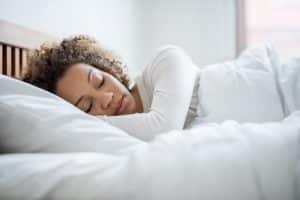Does My Mattress Affect My Sleep Apnea?

There are several forms of the condition, but the most common is obstructive sleep apnea (OSA). With this condition, breathing is difficult because of a physical obstruction somewhere in the airway. OSA symptoms are typically the result of soft tissue in the back of the throat moving collapses during sleep.
Does My Mattress Affect Sleep Apnea?
Not all factors that influence sleep apnea are under the control of the sufferer, and some – such as weight – may take time to gain influence over. However, there is one thing you can improve immediately, which is the quality of your sleep environment. Within the sleep environment, the most important factor is the quality of the mattress.
During sleep, the body calibrates its systems and addresses cellular damage acquired throughout the day. Regular, restful sleep in sufficient quantities is essential for all of the body’s systems to work at peak efficiency. Your mattress helps you reach and maintain deep, restful sleep.
A good mattress helps with sleep apnea in several ways:
Improved Sleep Posture
Better posture in sleep makes it easier for your body to maintain a healthy rhythm of breath all throughout the night. Experts state that sleeping on one’s side can reduce sleep apnea symptoms in many mild to moderate cases. A quality mattress is helpful when adjusting to any new sleep posture.
Faster and Deeper Sleep
Over time, most mattresses degrade and develop their own grooves and pits. Old-fashioned spring mattresses are especially notorious for this. A new mattress generally produces relief from aches and pains, which may make it easier to reach and sustain a deep state of sleep.
Better Circulation
Poor blood circulation makes sleep more difficult and makes it more likely that sleep apnea sufferers will wake during an apnea episode. A quality mattress should provide complete and even support for the body, ensuring circulation in the limbs and avoiding “pins and needles.”
Protection from Irritants
A new hypoallergenic mattress can be a good investment for people who struggle with allergies in conjunction with sleep disturbances. Allergens irritate the airways and make it more challenging to breathe. A mattress made from hypoallergenic material can defend against inflammation.
For Most Sleep Apnea Sufferers, a Good Mattress Is Not Enough
Most people with obstructive sleep apnea can achieve immediate improvement in their condition with the right treatment. Typically, that takes the form of an oral appliance or a CPAP mask that delivers continuous positive air pressure to support regular breathing during sleep.
While a good mattress is helpful, personalized help from sleep experts is essential.
Proper treatment begins with a clear and accurate diagnosis. That often means an overnight sleep study that will uncover the root causes of sleep disturbance. Then, a customized plan of care can be used to resolve symptoms and the restore the ability to enjoy restful sleep.
To find out more or get started with your treatment, contact eos dental sleep today.
